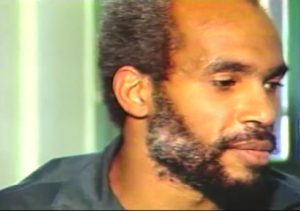Kuwasi Balagoon Video Interview

Many years ago, when working on what was originally envisaged as a pamphlet, a short collection of writings by Kuwasi Balagoon, i was told of a television interview with Balagoon, conducted while he was incarcerated following the failed Brinks expropriation of 1981. These were in the days before youtube or streaming or social media, and we didn’t even know what station had interviewed him or exactly when. So while the idea of an actual video interview existing somewhere was intriguing and tantalizing, we had no idea how to find it.
Fast forward almost twenty years, and as i was working on what would be (depending on your count) the third or fourth edition of Kuwasi Balagoon A Soldier’s Story — now a book, copublished with PM Press — a simple google search turned up a video, uploaded to the vimeo website. “Donald Weems 1980’s Interview” — this being the slave name Kuwasi was given at birth.*
While only a few minutes long, this interview by Alec Roberts of Independent Network News (WPIX-TV) is a precious opportunity to hear Balagoon speak, in his own voice and his own words. Well worth watching.
Kuwasi Balagoon 1980’s Interview on Vimeo.
* On the question of names, Balagoon explained in his July 11, 1983, Opening Trial Statement:
Donald Weems, the name that the prosecutor likes to use, is an alien european name. Donald is a Christian name—and i am not a Christian; and Weems is a Scottish name, and i am not Scottish. It’s a name that some slaver decided to brand what he considered his property with, and it is the name the state likes to use to propagate a colonial relationship. The english translation of Weems is “cave dweller.” i reject all that it means. […]
District Attorney Gribetz, Judge Ritter, and the state’s propaganda arm, the establishment media, have sought to obviate this by calling me a defendant, as well as my comrade Sekou Odinga, as if we were American citizens negotiating an internal domestic legal system. We reject this, as well as the insistence on calling us, as well as Assata Shakur, Abdul Majid, and other POWs by slave names. We know that it is not just a case of racist arrogance or legality and note that Zayd Malik Shakur changed his name through the courts years before he was killed by State Troopers on the New Jersey Turnpike and was still called by the state and the media by his slave name. This is to propagate a colonial relationship. (From: Kuwasi Balagoon A Soldier’s Story, pages 95, 101)
Leave a Reply